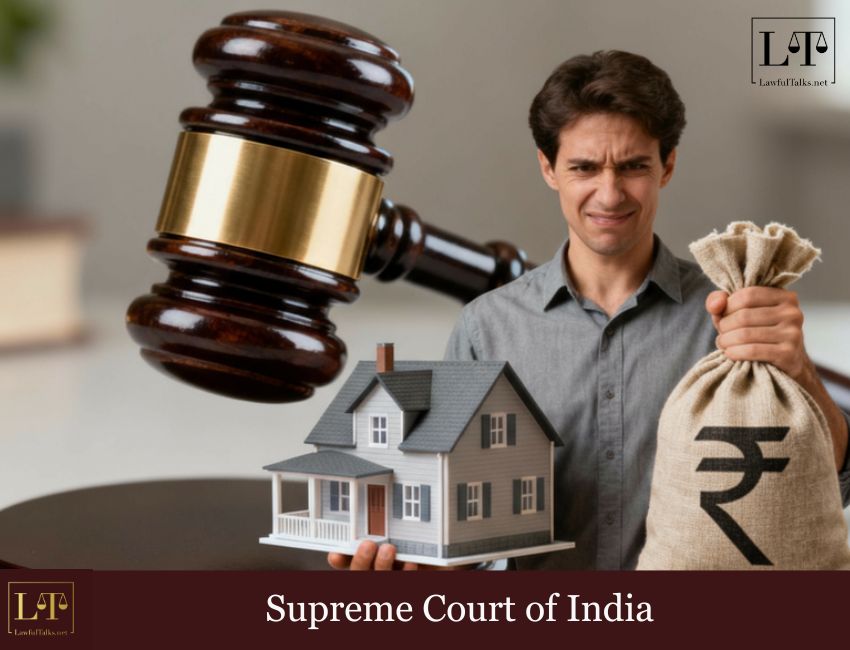Allahabad HC Sets Aside Afzal Ansari's Conviction, Allows Him to Continue as MP

In a recent ruling, the Supreme Court of India, through Justice Vikram Nath and Justice Sandeep Mehta, came down strongly on a litigant who sought to exploit an inadvertent omission in a previous order to unlawfully retain possession of a property.

The Court dismissed the appeal with costs of ₹10 lakh, remarking that equity will not allow a party to enjoy both compensation and possession, terming such conduct as an attempt at “unjust enrichment.”
Background
The dispute traces back to a sale agreement executed in 1989, under which the defendants agreed to sell a property for ₹14,50,000. The plaintiff paid an earnest money deposit of ₹25,000 and was handed possession of the ground floor, while the first floor was occupied by tenants. Shortly after, the plaintiff filed a suit seeking a permanent injunction to restrain the defendants from alienating or dispossessing him, which was later withdrawn.
In 1990, the plaintiff filed another suit seeking specific performance of the 1989 agreement to sell. This suit was decreed by the trial court in 2009, and both the first and second appeals were dismissed by the appellate courts, upholding the decree. However, when the matter reached the Supreme Court, the decree for specific performance was set aside on 1st April 2025, the Court holding that the suit was barred under Order II Rule 2 of the CPC.
Yet, while denying specific performance, the Supreme Court sought to balance the equities by awarding the plaintiff an extraordinary sum of ₹2 crores in lieu of the ₹25,000 earnest money — a compensation eight hundred times higher, intended to bring final closure to the decades-long dispute.
However, when the defendants deposited the amount in execution of the Supreme Court’s directions, the plaintiff refused to accept the payment and resisted surrendering possession. The Executing Court thereafter issued warrants of possession, and the High Court of Punjab & Haryana upheld that decision, dismissing the plaintiff’s revision petition.
The Judgement
Before the Supreme Court, the plaintiff contended that since the earlier order had not explicitly directed delivery of possession, he was entitled to continue occupying the property. The Court, however, rejected this argument outright, holding that such an interpretation would defeat the very purpose of the equitable relief.
The Bench observed that the award of ₹2 crores was a “whopping amount” compared to the earnest deposit and was granted to ensure finality and fairness – not as a windfall. Retaining both possession and compensation, the Court noted, would constitute unjust enrichment.
Quoting its own observations, the Court stated:
“Once it has been held that no relief can be granted for specific performance and an extraordinary amount has been awarded to compensate the meagre amount of advance is only to adjust the equities. Appellant cannot have any right to resist possession and should not have obstructed or resisted the delivery of possession.”, the court observed.
The Court further invoked the maxim Actus Curiae Neminem Gravabit (an act of the court shall prejudice no one), emphasizing that no party should be allowed to exploit an inadvertent omission by the court to their advantage. Justice Vikram Nath wrote:
“Accordingly, where a party has been disadvantaged by reason of an act of the Court, it is incumbent upon the Court to undo such prejudice and restore the party to the position he would have occupied but for such act.”.
This principle, the Court explained, requires courts to correct any procedural or clerical oversight that could otherwise cause injustice — especially when the omission was never meant to alter the substantive outcome.
Finally, the Supreme Court upheld the orders of the Executing Court and the High Court, affirming the issuance of possession warrants with police assistance and dismissing the appeal in unequivocal terms:
“We are thus satisfied that the Executing Court and the High Court have taken a correct view in directing for issuance of warrants of possession with police assistance. The appeal, therefore, deserves dismissal.”, the court held.
The Court concluded that the plaintiff, having been fully compensated with a substantial monetary award, had no further right to occupy the property.
The appeal was dismissed with costs quantified at ₹10 lakh, payable within four weeks, failing which the amount would carry 12% annual interest.
Case Title: Prem Aggarwal vs. Mohan Singh & Ors. (C.A.No……@ SLP (C) No. 26593 of 2025)

Het Dedhia
3rd Year Law Student from SVKM's Pravin Gandhi College of Law
Latest Posts
Categories
- International News 19 Posts
- Supreme Court 336 Posts
- High Courts 352 Posts






























































































































































































































































































































































































































































































































































































































































































































